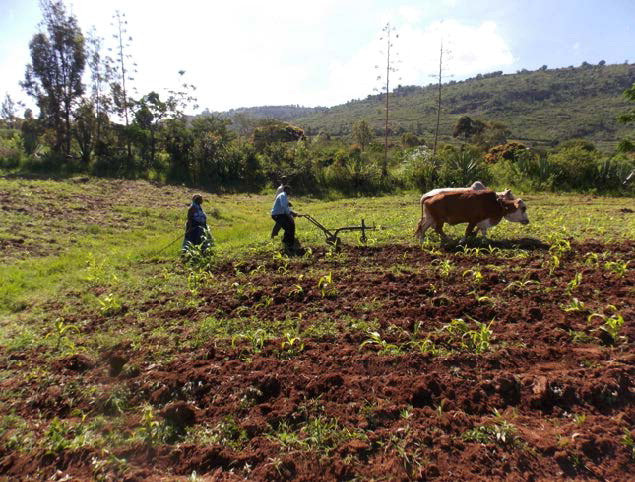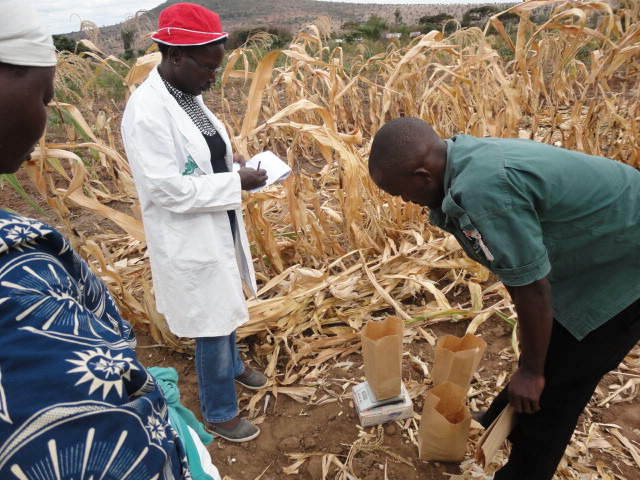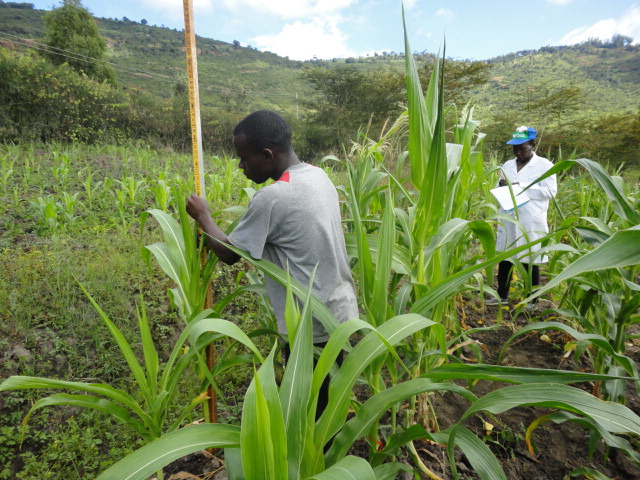|
Cycle 2 (2012 Deadline)
Unlocking agricultural potential in drylands: enhancing efficient utilization of soil moisture for improved smallholder farm productivity in ASALs of Kenya PI: Mary Baaru (Kenyatta University) U.S. Partner: Ethan Allen (Pacific Resources for Education and Learning)
Project Dates: August 2013 to October 2016 The amount of land devoted to agricultural uses has been reduced as a result of rising population and associated growing demands for land resources. This has resulted in increased exploitation of drylands. In view of this situation, utilization of the resource base in drylands areas can no longer proceed on a "business as usual” basis. This PEER Science project aims to address issues of water scarcity, deforestation, insufficient extension services, and lack of appropriate cropping systems in Kenya. Beyond its research components, the project also includes capacity-building activities designed for farmers in drylands areas. Groups of farmers will be trained on how to implement soil and water conservation measures and will be given kits to assist them in putting these measures in place, first on the farms of group members and later on non-member farms.
 | | Using cows to dig the land and prepare it for planting. Photo courtesy of Dr. Baaru |
Trained farmers will fill in the gap left by the shrinking extension service and ensure that information passed from farmer to farmer is reliable. The research to be carried out under the project will also provide in-depth understanding on moisture distribution and soil properties, as well as optimal cropping systems to utilize moisture for maximum land productivity. The project should result in improved landscapes on conserved farms, leading to reduced land and water degradation. Food security will be enhanced due to improved land productivity. Farmers will also be economically empowered and obtain improved living standards from increased sales of crops and livestock products.
Final Summary of Project Activities
The main objective of this project was to address issues of water scarcity, deforestation, insufficient extension services, and lack of appropriate cropping systems in Kenya. The project also aimed to provide in-depth understanding on moisture distribution and soil properties, as well as optimal cropping systems to utilize moisture for maximum land productivity. Beyond its research components, the project also included capacity building activities designed for farmers in drylands areas.
Trainings were conducted on farms selected in a participatory manner where extension officers, administration staff, and farmer groups were involved in selecting the most appropriate farm as a demonstration site. Fields activities were carried out on these plots which included land preparation, weeding, soil sampling, crop data collection and harvesting. This was done for three short and two long rainy seasons. Training of farmers was carried out to highlight the importance of water use efficiency, soil and water conservation and environmental degradation. About 45 farmers were well trained to be able to pass same knowledge to their fellow farmers.
The PI and her team worked with government agencies, mainly the Ministry of Agriculture, who are well versed with the area and farmers and provided linkages between the research team and farmers. It was important to collaborate with both government agencies and community groups as they could up scale the technology to other farmers. A survey was carried to find out community awareness on causes and impacts of soil erosion and a study to understand erosion hotspots was also carried out. Out of this work a master’s thesis was developed and the student graduated in September 2015.
In summary, results from the demonstration plots set up at the start of the project indicate that this technology could be an appropriate alternative to conserve and store water for increased production especially by the poor farmers who may not afford the expensive technologies. It is also possible that the adoption rate of the same practice was an improvement of what they already are doing, meaning the livelihoods of the communities could be enhanced. The results also indicate the need for capacity building in the community on soil erosion management. The survey indicated that most farmers did not understand what it was, the causes and how it can be prevented. This gave the extension agents a niche from where to start. They are using this technology as one of the simple alternatives in water conserving that can be embraced by farmers to increase crop yield. Kenyatta University is now developing a PhD program based on the PEER research achievements.
 |  | PhD student collecting crop yield parameters at harvesting. Photo courtesy of Dr. Baaru | PhD student and project assistant taking plant height data. Photo courtesy of Dr. Baaru |
| 





